‘When the lockdown started, I couldn't play with my friends anymore. We have been socially distancing and the radio helps me to cope with the unexpected loneliness’
Sofira, a 12-year old girl from the Rohingya refugee camps in Cox’s Bazar, does not run out of joys to list as she explains how the brand new radio she received from UNFPA has changed her life in the past months. Like countless other Rohingya youth in Cox’s Bazar, the COVID-19 pandemic has been a source of much anxiety and stress for Sofira and the radio has kept her occupied amidst the daily challenges.
She received the radio as part of UNFPA’s and the Australian Department of Foreign Affairs and Trade’s (DFAT) joint effort to address the mental health strains and educational challenges the pandemic poses for Rohingya youth and adolescents in Cox’s Bazar. The radios were included in Psychosocial Support kits that were distributed to 2,010 Rohingya youth and adolescents who had participated in UNFPA’s semi-virtual adolescent clubs in the camps. There are currently 67 of these clubs operating in the camps and they aim to help Rohingya adolescents in their transition to adulthood through life skills education.

In addition to the radio, the kits contained art supplies, memory cards with pre-recorded radio episodes on issues relevant to youth and adolescents and flashcards with crucial information on sexual and reproductive health and rights, gender-based violence and COVID-19. These items were not only meant to educate youth on how they can cope with the challenges posed by the pandemic, but to keep them informed and entertained despite the closure of schools and inability to meet with their friends.
"I love the recorded radio episodes. I now have a clear idea about things like power and control. When I grow up and become a young woman, I will not let others control me unlawfully or by force,” Sofira declares as she enthusiastically enumerates the different things she has learned through the episodes.

As part of the same initiative, UNFPA and DFAT also expanded the national Alapon Helpline service to cover the Rohingya camps. The Alapon Helpline is a toll-free help number, where young people between the ages of 10 and 24 and their parents can call to ask questions and receive psychosocial support from professional counsellors. As a result of the initiative, the Rohingya camps in Cox’s Bazar now have a separate number which the local communities can call to receive counseling in their own Rohingya dialect. The helpline is available for calls from 8am to 8pm, each day of the week.
As a curious young girl, Sofira has already taken advantage of the new service available to her: “I called the helpline a few days ago. I like Alapon, because all the counselors are kind with sweet voices. They are like my friends. Since I don't get to meet my friends, I call the counselors on Alapon,” she explains.
Despite the evident hardships caused by the pandemic, UNFPA remains committed to empowering and providing opportunities for adolescents and youth, across Bangladesh, including in the Rohingya camps and surrounding communities. By equipping young people with the right skills and knowledge, they can become true drivers of change in their communities.


